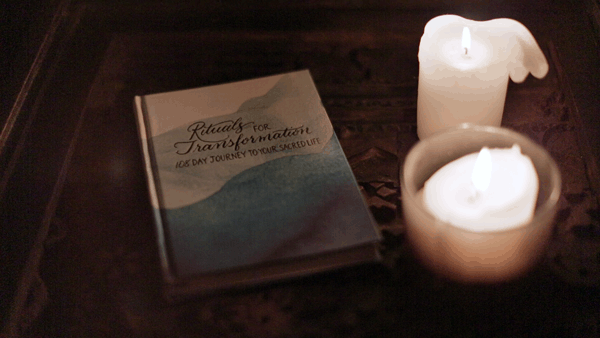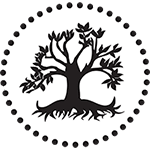Our Story
Why Rituals For Transformation?
Imagine what life would be like if you took 108 days and dedicated yourself not to learning, but remembering your true nature and the connection and unity of the universe.
Imagine what could be possible if you dedicated 108 days to deep introspection, tuning in, forgiving, honoring, reflecting, and embracing your highest Self!
Imagine…
- If you felt trust rather than fear in times of uncertainty?
- If you were at peace with your body, regardless of its appearance or function?
- If you weren’t controlled by your thoughts and emotions?
- If you were able to focus on all the things you’re grateful for, rather than being consumed by the problems?
- If you were at peace with whatever happens?
What would it be like to experience yourself as one with the Source of everything, playing in this life while always remembering that you are loved and connected?
Rituals For Transformation: A 108 Day Journey to Your Sacred Life is a book that directly speaks about spirituality and the awakening of human consciousness. We use the term awakening because the condition of everyday consciousness is often like being in a dream.
A dream in which anxiety and depression are considered normal, and awe and delight are less common than outrage or boredom.
A dream in which we lose contact with two of our greatest powers – the power to create and the power to see. That is, the power to create our life as we choose, and the power to see the truth – i.e., reality unadulterated by our thoughts, stories, beliefs and all the human drama.
In Rituals For Transformation we address several facets of the human condition that are instrumental in keeping us in this unempowered “dream state.” We organized 14 essential-for-our-expansion-and-peace topics into 108 lessons of the book. Throughout the book we return to each category repeatedly – making a sort of spiral through the lessons over three months.
Below are some of the topics we address in this journal.
Forgiveness
The opposite of forgiveness – what we might call resentment or holding grievances or perpetuating inner conflict – is a gigantic impediment to freedom and peace. There’s little, if anything, of greater value than freedom and peace, but we can’t be totally free or peaceful if we’re holding someone or something hostage in our mind.
Most people have much more resentment than they’re aware of. Upon diving in, we usually discover we resent ourselves for all the ways in which we aren’t being who we think we should be, and all the ways we believe we have obstructed our own happiness and success; our bodies for not looking, feeling, or performing the way we think they should; people for not behaving the way we think they should (not just those in our lives, but also politicians, corporations, and the big “they” who pollute, steal, murder, or otherwise make the world less the way we like it); the planet / the Universe / God for letting people die, making earthquakes, wildfires; etc.
Forgiveness is often difficult because we (usually subconsciously) believe that holding onto our grievances will eventually make things better for us – e.g., the world will repent and undo all the suffering it has caused us. It’s just the opposite, though. Withholding forgiveness keeps us trapped in suffering. And true, radical forgiveness is potentially the key to the life of ease and lightness we all want.
Resistance and Letting Go
In these lessons, we look at the mechanism of resistance. It’s a very primal survival mechanism – by resisting things that don’t feel or taste good, we might spare ourselves harm. But most people resist every feeling, thought, image, smell, person, situation, etc., that isn’t pleasant.
When we resist, there’s an underlying subconscious thought – “If I resist this, it will get better” – and it’s almost always untrue. Instead, the resistance itself becomes an uncomfortable burden that obstructs the authentic experience of reality. It also squelches our power, our energy, and our freedom.
Energy Awareness
Some sensitive individuals have an awareness of life energy. This is also true of those who have studied qi gong, tai chi, acupuncture, energy healing, and certain forms of yoga and meditation. They foster an awareness of a dimension of reality that isn’t part of most people’s everyday experience. We believe that such an awareness is gratifying and useful.
When you’re aware of your energy, you can perceive more clearly how you’re influenced by thoughts, foods, and interactions with the world. In this way, you can better understand what supports you and what doesn’t.
There’s clarity in being able to recognize what’s affecting your experience, and power in knowing how to be in harmony with your environment. The lessons in this section are meant to help one cultivate this form of awareness.
Self Care
When it comes to nurturing ourselves, some of us don’t do any conscious self-care, some approach self-care with a sense of obligation or burden, and some delight in the process.
The lessons on this topic are intended to help the reader approach it as a sacred and thoroughly enjoyable part of life. This engenders a sense of reverence and gratitude for oneself. It’s an opportunity to slow down and be present. And while such presence, by definition, means doing it for the in-the-moment experience, there are also inevitable benefits to one’s overall life from observing such a practice.
Connection With Nature
Humans are less conscious of Nature than ever before in our existence. It’s easy to live almost entirely indoors, in our minds, and in our little socialized worlds, forgetting how utterly dependent we are on the natural world – and how lost we’d be without it. These lessons are intended to rekindle this connection.
Inviting Nature into our lives does so much for us. It’s a source of constant awe and gratitude. We recognize just how intertwined the web of life is. We see that it provides for us in all ways. We remember that it birthed us. And when we approach it as a student to a teacher, we learn the timeless, balanced Way of the Universe.
Body Awareness and Reframing
The body (and, more importantly, how we relate to it) is one of the biggest impediments to human consciousness and potential. Most people have limited body awareness combined with excessive identification with the body.
By “limited body awareness,” I mean that we’re disconnected from our bodies – we tune out most of the intelligence and felt experience that are available to us through this physical vessel.
And by “excessive identification with the body” I mean that (despite being disconnected from what it’s telling us) we tend to define and judge ourselves based on how our body looks, feels, and performs – especially in comparison to others.
We started with the physical body because it’s the outermost level of our being. It’s also the most tangible or earthiest aspect of who we are. The lessons in this category focus on loving and being grateful for the body while recognizing that it isn’t who we are. We also focus on learning to feel into the body and reside more mindfully in it.
We look at ways in which our concept of the body leads to feelings of antagonism – how the body’s vulnerability to injury, aging, and sickness can make us feel threatened by it and hostile toward it. And we invite readers to honor and care for the body while also experiencing freedom from its limitations.
Reframing Thoughts And Feelings
We could say the mind (or ego – meaning our mental identity, our story about ourselves, which is informed by our body, thoughts, social roles, history, relationships, etc.) is the greatest obstacle to awareness. Even the ways that we’re limited by our body come down largely to our thoughts and feelings about it.
The mind isn’t intrinsically bad – we use it to solve problems, communicate, and performs all kinds of everyday tasks – and its associated feelings are part of the specialness of being a human.
But our thoughts and feelings have a tendency to completely monopolize our awareness, and in effect, they become our identity. That is, we forget that who we really are is something else – and when we forget, we lose our power and we suffer.
So, these lessons are about perceiving the difference between Awareness and thoughts/feelings, learning to make inner space so that we have the perspective that enables us to not be run by them. We learn to recognize our inner critic and other tricks of the ego, to see how it degrades our experiences, and to defuse its survival mechanisms. And we remind ourselves that it’s always possible to choose our Highest Self (Spirit) rather than the ego.

A 108-day guided journey for developing the kind of outlook that makes peace and joy accessible regardless of what’s happening in your life.
Knowing how busy people are these days, we made it so that you can benefit from it even if you’re only able to dedicate a modest amount of time and energy (though we encourage you to invest more whenever possible). Each day involves a small amount of reading (just one page), meditation, writing, and applying the day’s lesson throughout the day.
By the 108th day, you’ll be in a different place.
It’s a journey that will change you. If you’re someone who fears change, rest assured that the change we’re talking about is for your highest good. This means it may not be what’s easiest or fastest, but it’s the deepest and the realest kind of change.
